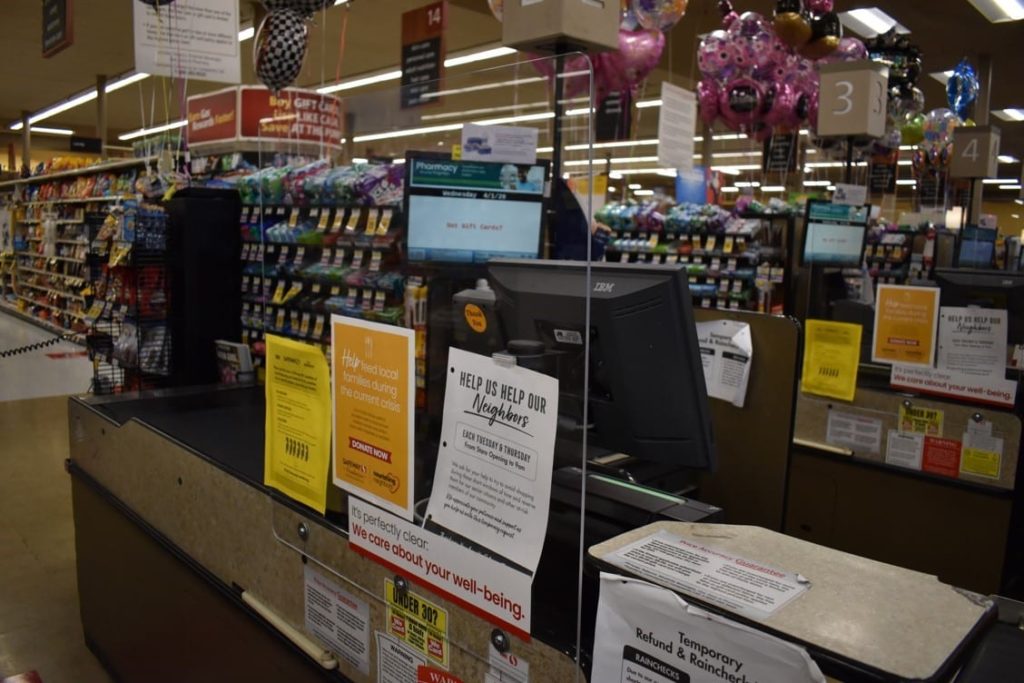In the midst of the coronavirus pandemic, supermarkets have taken new steps to protect customers and employees, from installing plexiglass dividers at checkout counters to placing stickers on the floor reminding people to stand 6 feet apart and around-the-clock sanitizing.
Although many businesses have been closed due to the pandemic, supermarkets are deemed essential and their workers remain at the forefront in the fight against COVID-19.
“We are taking this precaution very seriously,” said Henry Audon, assistant manager of Safeway in Almaden Valley. “We protect our employees so they can be here to serve the community. We speak daily about washing our hands, sanitizing and social distancing. These things will protect us, and our customers appreciate it.”
At Safeway, sanitation crews have been provided with color-coded vests and gloves. A janitorial service arrives at 5:30 a.m. daily to disinfect every dairy and freezer door, basket and shopping cart. Sanitation crews work all day cleaning everything in the store, Audon added, including the breakroom phones and time clocks.
“We’re doing what we have to do,” cashier Shannon Lowery said. “It’s scary for all of us.”
Plexiglass sneeze guards separate customers and cashiers at checkout counters, customer service, the pharmacy and the Starbucks within the market. Each checkout stand is equipped with sanitation wipes for the pin pads and disinfectant spray bottles for everything else.
“I think they’re doing a wonderful thing,” customer John Dumont said, “and I very much appreciate it.”

Photo by Lorraine Gabbert.
Because the county banned reusable bags due to the potential of spreading COVID-19, customers need to purchase grocery bags at checkout or pack their own groceries in their bags.
“Most of the time, we’re courteous and give them bags to help them out, especially on senior day,” Audon said. Senior days are Tuesdays and Thursdays, from 6 a.m. to 9 a.m.
Raley’s is following Centers for Disease Control and Prevention (CDC) guidelines, including having their employees wear masks and gloves. “The situation is evolving with new orders and information and we’re making modifications as needed,” said Chelsea Minor, corporate director of public affairs for Raley’s.
In addition to enhancing sanitation and cleaning procedures and closing the self-serving food bars, Raley’s/Nob Hill Foods gives employees what Minor calls “the grace and comfort to stay home if they’re not feeling well,” in addition to two weeks paid sick leave.
Managers ensure employees have hand sanitizer and wash their hands often, she said, and cashiers have the flexibility of stopping their line to wash their hands or wipe down keypads, registers and other surfaces. The produce section is limited to one entrance with arrows directing the flow of traffic.
No reusable bags are permitted in San Jose grocery stores. Although they don’t have employees arriving early to sanitize, everyone has sanitation responsibilities throughout the day.
“We’ve always had stringent standards as it relates to food safety,” Minor said. “It’s always been very important to us. We all have a responsibility to keep ourselves and our families safe, but for those who do choose to go into stores, we are doing everything we can to keep our environment as clean and safe as possible.”
Raley’s/Nob Hill Foods doesn’t offer special hours for seniors, instead recommending seniors take advantage of their e-commerce service or have others shop for them.
“There are some situations where it’s better to ask a neighbor, parents or grandparents, ‘What can I pick up for you today?’” Minor said.
Customer Lisa Schenberg, who was shopping for her elderly dad and cousin at Nob Hill on Snell Avenue, takes that advice to heart. Schenberg, who limits her grocery shopping to once a week because it makes her nervous to be out in public, said the safety measures are essential.
“Everything they do I really appreciate because we still have to come here,” she said.
Rafael Flores, a manager at Nob Hill, said his employees wipe down the check stands, dairy and freezer doors and “everything that gets touched” regularly.
“It’s been rough,” said cashier Kery Santana, who says a little prayer before she starts work each day. “You have to find the positive. I have a job, and luckily, we’re all working as a team here. That’s the most important thing. I’m glad I’m here serving the community, but it’s also a challenge.”
Contact Lorraine Gabbert at [email protected]



Leave a Reply
You must be logged in to post a comment.